- Home
- Nelson Branco
Soap Opera Uncensored: Issue 23 Page 2
Soap Opera Uncensored: Issue 23 Read online
Page 2
considering it was the only soap magazine back in the day to treat soaps seriously and thoughtfully.
It is unfortunate that, as the industry was beginning to bleed out, WEEKLY had been editorially dismantled at a corporate level (much like the soaps it covered). The magazine devolved into a PR vehicle for the networks, removing all the content and personality that made it so special, important and unique. Firing Mimi Torchin really sealed the magazine’s fate.
Luckily, several fan blogs and my TVGUIDE.CA columns, THE SUDS REPORT and SOAPGEIST, helped fill that niche left by the publishing-powers-that-be’s inept and narrow-minded management.
WEEKLY’s tardy arrival to the Internet, digital and blog world also didn’t serve itself well towards the end, either.
Having said all that, R.I.P., SOAP OPERA WEEKLY! I had a blast working at the magazine and reading it while it was great. I will never forget you.
FALL OF THE MOUSE HOUSE
FORBES LABELS ABC “STUPID”
Better late than never! At least someone in the mainstream media is fighting for GH’s future (other than just repurposing casting news and/or acting as ABC patsies): FORBES’ Roger Friedman lambastes the alphabet network for purposely sabotaging its daytime line-up. He wrote:
“It’s almost the end of March and so far, no closing notice for the ABC soap GH. It was on the docket for cancellation to make way for Katie Couric‘s talk show, which debuts September 10th. But lo and behold — ABC’s terrible decision to cancel its soaps and replace them with nattering nabobs hasn’t worked. It’s not just that THE CHEW and THE REVOLUTION, which replaced fan faves AMC and ONE LIFE — are unwatchable. They’re also not being watched. If ABC plans to cancel GH, they’re going to have to do it soon or will have no proper ending. (Not like AMC did — it was discourteously snuffed out in mid-sentence.) These shows may be cheaper to produce than soap operas, but all they’ve done is drive away audience and incurred enmity toward new programming. ABC now lacks Regis, Susan Lucci, Oprah Winfrey, and the 43-year loyalty to ONE LIFE. One day their mistakes will be discussed in alongside New Coke and the Tropicana container disaster.”
While some news outlets have voiced their disapproval of ABC’s lightweight management, an editorial on FORBES.COM — the industry’s financial bible — will definitely get ABC and Disney’s self-serving, passive-aggressive attention. And if you know Freidman, whom I have met on several occasions, you know he’s a bitch with a bone.
CABLE WARS
WILL DISNEY JUNIOR TAKE OFF?
BLOOMBERG BUSINESS WEEK published an interesting and enlightening analysis of ABC/Disney’s latest genius decision to replace SoapNet for Disney Junior (though SOAPnet will be available for the foreseeable future on another channel in most markets). Here it is:
For more than 70 years, Walt Disney has used a warbling Jiminy Cricket to encourage families to wish upon a star. These days, Disney is banking on DOC MCSTUFFINS, featuring a 6-year-old in a lab coat and pink-sequined sneakers who fixes ailing toys. The cartoon will debut on Disney Junior, a cable-TV network for 2- to 7-year-olds that the company is launching on March 23 in about 30 million U.S. households. If all goes according to plan, Disney will bring in big future sales from those tiny viewers.
Preschool programming is the latest front in a decade-long war between Disney and Viacom, the longtime leader in children’s cable television with its Nickelodeon networks. Kids’ TV has become a lucrative business because it can earn money from cable subscriber fees, advertising, and merchandise royalties. That’s why Disney is shuttering Soapnet, a 12-year-old channel devoted to soap operas, and shifting those subscribers over to what will be its fourth network aimed at families and young people, after ABC Family, the Disney Channel, and Disney XD, a four-year-old channel for boys. “It’s a better monetization of beachfront property,” says David Bank, an entertainment analyst at RBC Capital Markets. “[If] you have a hit show, it sells records, consumer products, and movies. They want to capture that consumer for a lifetime.”
An animated TV show costs about $13 million for a 26-episode season — a fraction of the price tag for a major motion picture — and can fuel sales of related products for years, says Sean Cocchia, general manager of Disney Channels Worldwide. DOC MCSTUFFINS will have an exclusive line of products in Toys ‘R’ Us stores in June, including dolls and a doctor’s kit. “It’s not like putting up a billboard and you’re reaching a lot of people who may not be interested,” says Cocchia. “We’re able to target consumers in a much more specific way.”
Disney’s youth cable strategy began to evolve in 2001 when the company focused on tweens with live-action comedies such as LIZZIE MCGUIRE and HANNAH MONTANA, and then even younger kids with the 2007 cartoon hit PHINEAS and FERB. Disney Channel has seen its audience rise almost 5 percent in the past two years, to 969,000 daily viewers, while Nickelodeon’s has slid 19 percent, to 999,000, says researcher Nielsen.
Viacom says its worldwide cable ad revenues fell 3 percent, to $1.35 billion, in the quarter ending Dec. 31, in part because of Nickelodeon’s weaker ratings. “We’ve been the No. 1 kids entertainment brand for 17 years,” says Dan Martinsen, a spokesman for Nickelodeon. “We have no intention of giving that up.”
Disney Junior enters a crowded playground that includes not just Nickelodeon and its three spin-offs, Nick Jr., TeenNick, and Nicktoons, but also Time Warner’s Cartoon Network and the Hub, a two-year-old joint venture between Discovery Communications and toymaker Hasbro. One distinction Disney Channel and Disney Junior have, says Cocchia, is that they are largely ad-free, featuring only spots for Disney movies and shows, and some limited sponsorships such as a recent one from Reckitt Benckiser’s Lysol disinfectant reminding kids to wash their hands.
The “uncluttered” programming allows it to fetch premium fees from pay TV operators, Cocchia says. Disney Channel generates revenue from cable operators of 94¢ per subscriber a month, vs. 50¢ for Nickelodeon, according to researcher SNL Kagan. That’s $1.2 billion and $605 million in annual subscriber fees, respectively, says Kagan. Nickelodeon also gets $1 billion a year in ads, Kagan estimates.
Disney’s strategy resonates with some parents. Sabrina Doherty, a Los Angeles mother of two, says she prefers commercial-free PBS but favors Disney Channel over Nickelodeon because it has fewer ads. “I don’t think my kids know what a commercial is, so ad-free is a big bonus,” she says.
Translation: Ad-free? I doubt Disney even cares what revenue they generate in per subscriber/per monthly fees for this particular channel because it’s been created by design to sell Disney consumer products. Sorry, Sabrina Doherty: Disney Jr. is one big ad.
COVER STORY
SOAP OPERA PARADISO
Daytime’s most iconic producer Paul Rauch may swim with sharks — but he always gets the last bite!
Having bore witness to the birth, growth and imminent destruction of the traditional soap opera genre he loves so much, Paul Rauch still believes in the future of daily serial storytelling.
It’s been one year since the former network president and ANOTHER WORLD, TEXAS, SANTA BARBARA, ONE LIFE and Y&R executive producer left daytime but he’s still as engaged in the medium as it faces its biggest cliffhanger ever: extinction. Even if he is on the sidelines.
With his beloved ONE LIFE off the air for almost three months, UNCENSORED decided to check in with the Wizard of Soaps to discuss Cartini’s arrival at GH; Ellen Holly’s recent attacks on him in the media; what went wrong at Prospect Park; Oprah’s OWN debacle; and how he’s been filling his time since leaving Y&R (he’s still working).
Are you watching GH these days?
I watch GH periodically. I think Ron and Frank are doing a good job. I just hope that if there is growth, ABC will keep it on. I’m not sure if they will.
THE REVOLUTION is doing pretty badly so there is some hope. Have you heard that OWN cancelled Rosie O’Donnell’s talk show and laid off 30 employees? Oprah made a big mistake not licensing AMC and ONE LIFE.
The wor
ld out west made her deity — and she believed she was a deity. She made a mistake a lot of people in show business make: when you rise to a certain level, they never realize that you can no longer sustain that level over the years.
Plateau City! I think this was a good lesson for Oprah because I suspect she thought launching her own network would be easy – even in this recession!
She thought everything would be easy.
The last time we spoke, Oprah had made a controversial statement saying daytime drama was no longer financially viable. Clearly, so is OWN!
I was particularly upset about her comments. I thought she threw that remark off the cuff and it’s clear she didn’t know what she was talking about. Since all these soaps have been cancelled, I think there is a displaced audience out there that feels disenfranchised.
I don’t wish anyone failure, especially Oprah because I love and respect her so much; but soap fans are less forgiving than I! All she had to say was, “I’m not taking them on because soaps don’t fit into our business model and/or creative direction.” Moving on… Did you watch ONE LIFE’s final episode?
Yes, I thought it was good.
It

 Nelson Branco's Soap Opera Uncensored: Issue 43
Nelson Branco's Soap Opera Uncensored: Issue 43 Soap Opera Uncensored: Issue 34
Soap Opera Uncensored: Issue 34 Soap Opera Uncensored: Issue 21
Soap Opera Uncensored: Issue 21 Nelson Branco's SOAP OPERA UNCENSORED: Issue 55
Nelson Branco's SOAP OPERA UNCENSORED: Issue 55_preview.jpg) Soap Opera Uncensored: Issue 6 (UPDATED)
Soap Opera Uncensored: Issue 6 (UPDATED) Nelson Branco's SOAP OPERA UNCENSORED: Issue 57
Nelson Branco's SOAP OPERA UNCENSORED: Issue 57 Nelson Branco's SOAP OPERA UNCENSORED: Issue 47
Nelson Branco's SOAP OPERA UNCENSORED: Issue 47 Soap Opera Uncensored: Issue 25
Soap Opera Uncensored: Issue 25 Soap Opera Uncensored: Issue 22
Soap Opera Uncensored: Issue 22 Soap Opera Uncensored: Issue 24
Soap Opera Uncensored: Issue 24 Nelson Branco's Soap Opera Uncensored: Issue 44
Nelson Branco's Soap Opera Uncensored: Issue 44 Soap Opera Uncensored: Issue 30
Soap Opera Uncensored: Issue 30 Soap Opera Uncensored: Issue 32
Soap Opera Uncensored: Issue 32 Soap Opera Uncensored: Issue 15
Soap Opera Uncensored: Issue 15 Soap Opera Uncensored: Issue 27
Soap Opera Uncensored: Issue 27 Soap Opera: Uncensored
Soap Opera: Uncensored Nelson Branco's SOAP OPERA UNCENSORED: Issue 53
Nelson Branco's SOAP OPERA UNCENSORED: Issue 53 Nelson Branco's Soap Opera Uncensored: Issue 40
Nelson Branco's Soap Opera Uncensored: Issue 40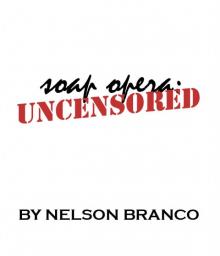 Soap Opera Uncensored: Issue 10
Soap Opera Uncensored: Issue 10 Nelson Branco's Soap Opera Uncensored: Issue 36
Nelson Branco's Soap Opera Uncensored: Issue 36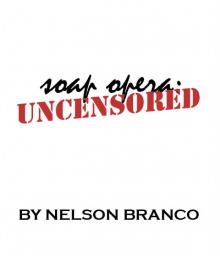 Soap Opera Uncensored — Issue 17
Soap Opera Uncensored — Issue 17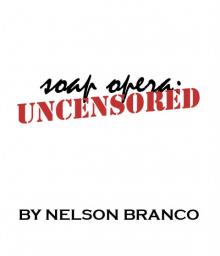 Soap Opera Uncensored — Issue 18
Soap Opera Uncensored — Issue 18 Soap Opera: Uncensored Issue 3
Soap Opera: Uncensored Issue 3 Nelson Branco's Soap Opera Uncensored: Issue 41
Nelson Branco's Soap Opera Uncensored: Issue 41 Nelson Branco's SOAP OPERA UNCENSORED: Issue 84
Nelson Branco's SOAP OPERA UNCENSORED: Issue 84 Nelson Branco's Soap Opera Uncensored: Issue 45
Nelson Branco's Soap Opera Uncensored: Issue 45_preview.jpg) Soap Opera Uncensored: ISSUE 5 (UPDATED)
Soap Opera Uncensored: ISSUE 5 (UPDATED) Nelson Branco's SOAP OPERA UNCENSORED: Issue 59
Nelson Branco's SOAP OPERA UNCENSORED: Issue 59 Soap Opera Uncensored: Issue 29
Soap Opera Uncensored: Issue 29 SOAP OPERA UNCENSORED: ISSUE 9
SOAP OPERA UNCENSORED: ISSUE 9 Nelson Branco's Soap Opera Uncensored: Issue 38
Nelson Branco's Soap Opera Uncensored: Issue 38 Nelson Branco's Soap Opera Uncensored: Issue 42
Nelson Branco's Soap Opera Uncensored: Issue 42 Nelson Branco's SOAP OPERA UNCENSORED: Issue 50
Nelson Branco's SOAP OPERA UNCENSORED: Issue 50 Soap Opera Uncensored: Issue 7
Soap Opera Uncensored: Issue 7 Nelson Branco's SOAP OPERA UNCENSORED: Issue 54
Nelson Branco's SOAP OPERA UNCENSORED: Issue 54 Soap Opera Uncensored: ISSUE 8
Soap Opera Uncensored: ISSUE 8 Soap Opera Uncensored: Issue 26
Soap Opera Uncensored: Issue 26 Soap Opera Uncensored: Issue 33
Soap Opera Uncensored: Issue 33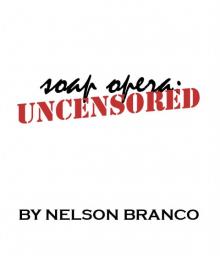 Soap Opera Uncensored — Issue19
Soap Opera Uncensored — Issue19 Soap Opera Uncensored: Issue 31
Soap Opera Uncensored: Issue 31 Soap Opera Uncensored: Issue 12
Soap Opera Uncensored: Issue 12 Soap Opera Uncensored: Issue 23
Soap Opera Uncensored: Issue 23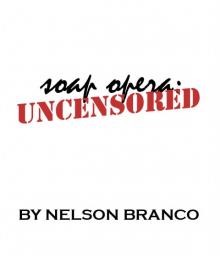 Soap Opera: Uncensored — Issue 4
Soap Opera: Uncensored — Issue 4 Nelson Branco's Soap Opera Uncensored: 35
Nelson Branco's Soap Opera Uncensored: 35 Nelson Branco's SOAP OPERA UNCENSORED: Issue 52
Nelson Branco's SOAP OPERA UNCENSORED: Issue 52 Soap Opera Uncensored: Issue 20
Soap Opera Uncensored: Issue 20 Nelson Branco's SOAP OPERA UNCENSORED: Issue 56
Nelson Branco's SOAP OPERA UNCENSORED: Issue 56_preview.jpg) Soap Opera Uncensored: Issue 14 (Vol.2, Issue 4)
Soap Opera Uncensored: Issue 14 (Vol.2, Issue 4) Nelson Branco's SOAP OPERA UNCENSORED: Issue 48
Nelson Branco's SOAP OPERA UNCENSORED: Issue 48 Soap Opera Uncensored: Issue 16
Soap Opera Uncensored: Issue 16 Nelson Branco's SOAP OPERA UNCENSORED:Issue 49
Nelson Branco's SOAP OPERA UNCENSORED:Issue 49